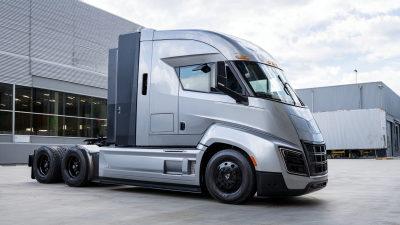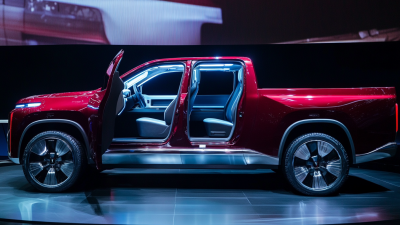Sorry. We did not find anything.
Exploring the Future of Transportation with Chinese Electric Trucks
 The transportation sector is undergoing a significant transformation, with the rise of electric vehicles reshaping logistics and freight services across the globe. Among the leading players in this electric revolution are Chinese electric trucks, which are quickly gaining traction in both domestic and international markets. According to a report by the International Energy Agency, electric truck sales in China soared by over 150% in the last year alone, reflecting a growing shift towards sustainable transportation solutions. This surge is driven by advancements in battery technology, government incentives, and a heightened awareness of environmental impact. As we explore the future of transportation, it becomes evident that Chinese electric trucks are not just a trend; they represent a pivotal movement towards more efficient, eco-friendly freight systems that could redefine the industry landscape in the coming years.
The transportation sector is undergoing a significant transformation, with the rise of electric vehicles reshaping logistics and freight services across the globe. Among the leading players in this electric revolution are Chinese electric trucks, which are quickly gaining traction in both domestic and international markets. According to a report by the International Energy Agency, electric truck sales in China soared by over 150% in the last year alone, reflecting a growing shift towards sustainable transportation solutions. This surge is driven by advancements in battery technology, government incentives, and a heightened awareness of environmental impact. As we explore the future of transportation, it becomes evident that Chinese electric trucks are not just a trend; they represent a pivotal movement towards more efficient, eco-friendly freight systems that could redefine the industry landscape in the coming years.
Benefits of Electric Trucks: Revolutionizing Logistics and Reducing Costs
Electric trucks are transforming the logistics landscape, bringing both environmental sustainability and economic efficiency to the forefront of the transportation industry. According to a report by McKinsey & Company, electric trucks can reduce operational costs by up to 30% compared to traditional diesel vehicles. This significant savings stems from lower fuel expenses and reduced maintenance costs, as electric powertrains have fewer moving parts and require less frequent servicing.
The transition to electric trucks also aligns with the rising demand for sustainable practices in logistics. Research from the International Energy Agency indicates that electric trucks have the potential to cut greenhouse gas emissions from road freight by more than 50% by 2030. As companies adopt electric vehicles, they not only comply with stricter emissions regulations but also enhance their brand image by demonstrating a commitment to sustainability.
Tips: When considering the shift to electric trucks, businesses should evaluate their specific logistics needs and the total cost of ownership rather than just the upfront costs. Additionally, partnering with electric truck manufacturers can provide insights into the latest technology and models that suit your operational requirements, ensuring a smooth transition and maximizing benefits.
Enhancing Sustainability: The Environmental Impact of Chinese Electric Trucks
As the demand for sustainable transportation solutions grows, Chinese electric trucks are emerging as a crucial player in reducing carbon emissions. According to a report by the International Energy Agency, the transportation sector is responsible for nearly 24% of global CO2 emissions, with heavy-duty trucks accounting for a significant portion of that. By transitioning to electric trucks, we can dramatically lower these emissions. A study reveals that electric trucks can cut greenhouse gas emissions by up to 60% compared to their diesel counterparts, especially when charged using renewable energy sources.
**Tip:** When evaluating electric truck options, consider not just the purchase price but also the total cost of ownership, which includes fuel savings, maintenance costs, and potential government incentives.
Moreover, Chinese manufacturers are not only competing on performance but also on sustainability. Many of these trucks are equipped with advanced battery technology that enhances energy efficiency and extends range. The Global Commercial Vehicle Market report indicates that the electric truck market is projected to grow by over 20% annually, driven by innovations in battery technology and increased regulatory pressure for carbon reductions.
**Tip:** Stay informed about government regulations and incentives related to electric vehicles in your region, as these can significantly impact the financial viability of transitioning your fleet to electric trucks.
Advanced Technology in Electric Trucks: Batteries and Smart Features
As electric trucks become a crucial part of the transportation landscape, advancements in battery technology and smart features are at the forefront. According to a report by the International Energy Agency (IEA), global electric vehicle sales reached 2 million units in 2020, and electric trucks are expected to capture a significant market share in the coming years. By 2030, it is projected that the market for electric trucks could be worth $168 billion, driven by improvements in battery efficiency and range.

One of the key innovations in electric trucks is the development of high-capacity batteries. The latest lithium-ion batteries now offer energy densities exceeding 250 Wh/kg, enabling trucks to achieve longer ranges—often exceeding 600 km on a single charge. This advancement is crucial for logistics companies aiming for sustainable operations. Furthermore, smart features such as advanced driver-assistance systems (ADAS) are being integrated into electric trucks to improve safety and efficiency. A market analysis by Frost & Sullivan suggests that the implementation of these technologies can reduce transportation costs by up to 20%, making electric trucks not only eco-friendly but also economically viable for fleet operators.
Market Growth Projections: The Future of Electric Truck Adoption in China
As the demand for sustainable transportation solutions grows, the market for electric trucks in China is projected to see significant expansion. With government initiatives aimed at reducing carbon emissions and promoting clean energy, the adoption of electric trucks is set to accelerate. Industry analysts predict that by 2030, electric trucks could account for a substantial share of the logistics market, driven by advancements in battery technology and charging infrastructure.
Tip: For businesses looking to transition to electric fleets, it’s essential to evaluate the total cost of ownership, including maintenance and fuel savings. Investing in electric trucks not only contributes to environmental goals but can also lead to long-term financial benefits.
Moreover, urbanization and increasing e-commerce activities are compelling logistics companies to rethink their transportation strategies. Electric trucks offer the advantage of reduced noise and air pollution, making them ideal for city deliveries. As Chinese consumers become more environmentally conscious, brands that embrace electric vehicle solutions will likely gain a competitive edge.
Tip: Start by assessing the specific needs of your delivery routes and the available charging technologies. Collaborating with electric truck manufacturers can provide insights into the best models suited for your operational requirements.
Government Policies and Incentives for Electric Truck Development in China
In recent years, the Chinese government has implemented a range of policies and incentives aimed at accelerating the development of electric trucks. Recognizing the pressing need for sustainable transportation solutions, initiatives such as subsidies for manufacturers, tax breaks, and investment in charging infrastructure have played a pivotal role. These measures not only lower the barriers to entry for companies looking to innovate in this sector but also encourage existing manufacturers to pivot towards electric offerings.
Furthermore, local governments are increasingly adopting green procurement policies that favor electric trucks for public transport and logistics operations. This creates a stable demand for electric vehicles, further stimulating production and investment. Additionally, the government is collaborating with private enterprises to establish research and development partnerships, ensuring that China remains at the forefront of electric truck technology. By fostering a robust ecosystem of support, the Chinese government is paving the way for a cleaner, more efficient transportation future.

Related Posts
-

Top Strategies for Sourcing the Best All Electric Truck Globally
-

Ultimate Checklist for the Best New Electric Cars You Need to Know in 2023
-

Maximizing Efficiency with Electric Pickups: Insights from 2023 Industry Trends and Market Data
-

Ultimate Showdown of the Best New Electric Vehicles on the Market
-

What Are the Benefits of Investing in New Electric Vehicle Technology?
-

Discovering Full Electric Cars Opportunities at the 137th Canton Fair in Guangzhou
